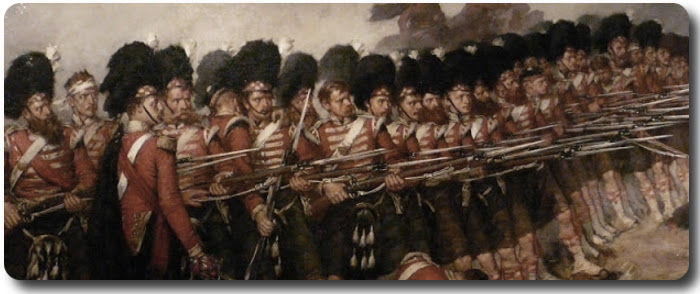Topic: Tradition

Detail from The Thin Red Line (The Sutherland Highlanders at the Battle of Balaclava 1854), by Robert Gibb
Esprit de Corps
The Regiment! It is impossible for a foreigner to realise what that word means to a British soldier.
The Soul and Body of an Army, General Ian Hamilton, G.C.B., 1921
Thus, automatically, our Army remains brimful of esprit de corps. This spirit is not, as used to be the case in Germany, brewed by the State. Clerks in the War Office used to be always on the nibble at any speciality in custom or dress upon which corps took a particular pride. Nor, in posting to corps, did the Military Secretary treat ancestors very nicely. On the contrary three generations in a regiment count for less in the eyes of our Army Council than three miserable marks in a miserable competitive exam. Still, the spirit is brewed and flows in, so to say, on its own. Officers as well as men manage to get back into old corps in which served their fathers and grandfathers. Units have their own private gala days; uniforms and colours blossom out with roses again on each 1st of August in memory of the battle amongst the roses at Minden in 1759; badges are fixed to the back of the helmet to commemorate 1801, when cavalry were beaten off by the rear rank facing "about" instead of forming square; mourning lace is worn by the corps which took part in the burial of Sir John Moore at Corunna or of Wolfe at Quebec. In fact, in any and every possible way, tradition puts its marks upon something of which helmets, lace and nicknames are only the outward and visible signs. One way or another the roots of tradition strike down deep. The soldier feels the regiment solid about him, The Regiment! It is impossible for a foreigner to realise what that word means to a British soldier. The splendour — the greatness — the romance of this awe-inspiring, wonderful creation in which he himself is privileged to have his being!

